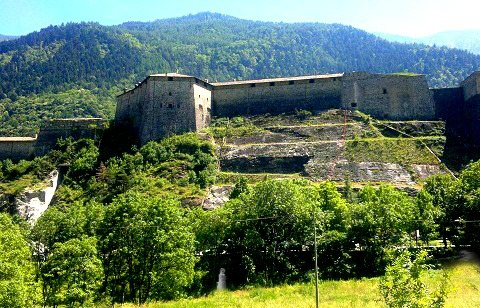Login with your member password below to see your content
Why not become a Supporter?
Click the more info button to see what we offer...
The Castle of Exilles
Haunted by the Man in the Iron Mask?
The Castle of Exilles in Piedmont is a remarkable structure with a history dating back to the 12th century. It played a significant role in the defense of the Piedmont region and the route to Provence through Monginevro.
However, the castle is best known as the prison of the “man in the iron mask,” whose true identity remains a mystery to this day. It is believed that the man spent seven years of his life at the castle, from 1681 to 1687, where he was forced to wear an iron mask to conceal his face and identity.
I saw the film "The Man in the Iron Mask," which told the story of his life, but the film is only loosely based on facts and no one is sure who the poor guy was.
His ordeal comes vividly to life as you tour this castle, but watch out that you don't bump into his ghost; he is said to stalk the corridors and dark corners.
A Incredible History of the Castle of Exilles
The Castle of Exilles in Piedmont is located in an area of Piedmont considered of extreme strategic importance dating back to before Roman times. The castle defended the key route from Piedmont to Provence via Monginevro.
It is another one of those amazing places in Piedmont that hasn’t yet been discovered by the mass tourist market. The original castle construction dates back to 1155, when the count of Albon wished to exercise control over the western reaches of his kingdom.
In 1601, with the adjustment of the Savoy border, the castle was further modernized by the engineer Jean de Beins in order to better resist artillery fire. It didn't do much good, though, because the French nearly destroyed the place in 1796. It was subsequently reconstructed in 1818 and was used by the military right up until the end of WW2.
Through the Castle Gates
The castle was built on three defensive levels and once past the first defensive level and entering through the Royal Gate, you come across the pit, which is 70 meters deep and took four years to dig.
Next, head up to the Cortile del Cavaliere. This austere area is now used to host summer "concerts in a castle," a fantastic idea and something that definitely succeeds in adding a little levity to the somber mood of the castle. I couldn't find a schedule of the concerts; they seem to only have the details at the castle entrance and not online anywhere. However, if you see them advertising a concert while you are in the area, do try to attend; they are an incredible experience.
After the Cortile del Cavaliere area, continue through the labyrinthine passages of the castle. This walk takes in the armory and the dungeons and includes the royal battery and the stairs “to paradise.” The stairs lead up to the Cortile delle Galere and onwards to the attics and the roof with extraordinary views across the paradise that is the Val di Susa (click for article).
All in all, the castle is a great Italian castle and one of the highlights of a Piedmont itinerary. Visit before the masses discover it. However, be careful not to bump into the ghost that is said to roam the corridors and dark corners of the castle.
Getting to the Castle of Exilles
The castle is very easy to get to from Turin—if you have a car! Take the A32 Frejus Autostrada and take the Susa exit. You then follow the SS24 in the direction of Monginevro, and after 15 km, you'll see it.
Opening Hours
During winter (4 October to 6 April), the hours are
Tuesday and Friday 10.00-14.00
Wednesday, Thursday, Saturday, and Sunday 14.00-18.00
Monday—closed
During summer, the castle is open every day, except Monday, from 10.00 to 19.00.
The hours can be a bit variable and there is not even a dedicated official website for the castle. There is a contact number on the TurismoTorino website that you can try to contact before you visit in order to confirm times. The number is +39 3276262304
- HOME
- Discovering Piedmont
- Castle of Exilles





